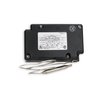Waterproof Outdoor Thermostat for Pipe Freeze Protection or Roof and Gutter Deicing Systems
- Hardwired electrical connection
- Outdoor-rated: NEMA Type 4X and an Ingress Protection rating of IP66
- Fixed temperature setpoint of 40°F
- For 120V or 240V self-regulating roof and gutter deicing and pipe freeze protection systems
- Covered by a 2-year warranty
Waterproof Outdoor Thermostat Description
The AIR-STAT outdoor thermostat provides basic control for roof and gutter deicing or pipe freeze protection systems. It detects temperature only, activating the system for continuous operation at 40°F or below. The AIR-STAT thermostat is UL Listed and features a NEMA 4X enclosure and a 3 –foot, bulb-and-capillary type sensor. It is rated for a maximum 22 amps and can be used with 120V or 240V roof and gutter deicing systems. Comes with a built-in capillary bulb sensor with a 3 foot sensor lead.
Specifications
Electrical
| Activation Temperature | 40 °F |
| Connection Method | Hardwired |
| Maximum Load (Resistive Only) | 22 A |
| Voltage | 125, 250, and 480 VAC |
Warranty / Certifications
| Approvals | UL and CSA listed |
| Area of Use | Non-hazardous locations |
| Ingress Protection (IPxx) Rating | IP66 |
| Warranty | 2 years |
| Waterproofing | NEMA 4X |
Product Dimensions
| Depth | 2.5″ |
| Height | 3.25″ |
| Installed Depth | 0.75″ |
| Weight | 1.2 lbs |
| Width | 5.25″ |
Thermostat
| Included Sensor | 1 capillary bulb, 3' lead |
Identifiers
| SKU | AIR-STAT |
| UPC (GTIN-12) | 881308056018 |
Documents
Installation
- Roof And Gutter Cable Installation Manual (French)
- Roof And Gutter Cable Installation Manual (Spanish)
- SR-PWR-Kit Power Connection Kit Installation Manual (English)
Operation Manuals
Technical Information
- AIR-STAT Outdoor Thermostat Spec Sheet (English)
- Self-Regulating Pipe Freeze Protection Controls Comparison Chart CANADA (English)
Sell Sheets
Catalogs
Frequently Asked Questions
Showing all 5 questions
Our self-regulating heating product is designed to be cut to length at the jobsite by an installer where it can then be end-capped with accessories (sold separately).
However, our constant wattage kits contain heating elements that cannot be shortened or altered in any way.
GFEP is the National Electric Code (NEC) required protection for fixed outdoor deicing and snow-melting equipment, which may be accomplished by using circuit breakers equipped with ground-fault equipment protection (GFEP) of 30 mA. It is important to understand that this required equipment protection is NOT the same as a 5 mA GFCI used for personal protection.
Cable length needed depends on the sizes and areas of the roof that need to be deiced (roof with gutter, downspouts, valleys, and/or dormers). Our best recommendation is for you to give us a call (1-800-875-5285) and we can help you identify what measurements will need to be taken. Alternatively, you can
measure the dimensions of the aforementioned areas and refer to the installation manual to get an idea of how much cable you'll need.









